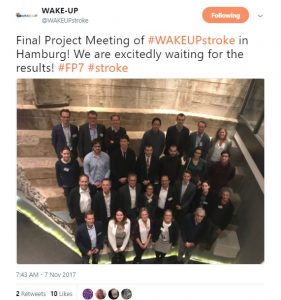
WAKE UP Clinical Trial Update
WAKE-UP was a European multicentre investigator-initiated randomized placebo-controlled clinical trial of MRI based thrombolysis in acute stroke patients with unknown time of symptom onset, e.g. due to recognition of stroke symptoms on awakening.
Stroke is a devastating disease leading to death and disability in large numbers of patients with massive social and economic impact. Intravenous thrombolysis with Alteplase is available as effective and safe treatment of acute stroke within 4.5 hours of symptom onset. However, in about 20% of acute stroke patients time of symptom onset is unknown e.g. because symptoms are recognized when waking-up from sleep in the morning. This large group of patients is currently excluded from treatment with Alteplase only due to the missing information on the time of symptom onset. In preparatory work the WAKE-UP consortium has developed an innovative approach of using brain MRI as surrogate marker of stroke lesion age which may be used to identify stroke patients likely to benefit from thrombolysis.
The Project started in 2013.  WAKE UP was led by an active and motivated consortium combining central trial management with decentralised organisation with national coordinators, with a clear communication structure and share of responsibilities, which led to the successful completion of the project.
WAKE UP was led by an active and motivated consortium combining central trial management with decentralised organisation with national coordinators, with a clear communication structure and share of responsibilities, which led to the successful completion of the project.
WAKE-UP aimed to improve the treatment of stroke patients. The core of WAKE-UP was an investigator-initiated randomized controlled trial of MRI based thrombolysis in patients waking up with stroke symptoms.
The objective of WAKE-UP was to test efficacy and safety of MRI-based intravenous thrombolysis with Alteplase in patients waking up with stroke symptoms or patients with unknown symptom onset. By this, WAKE-UP aims at providing a new safe and effective treatment option for acute stroke patients waking up with stroke symptoms.
The project is centrally coordinated by the Universitätsklinikum Hamburg-Eppendorf (Prof. Christian Gerloff; deputy coordinator: Dr. Götz Thomalla).
During the WAKE UP trial, imaging software (SONIA) was developed for the purpose of this project, yet this software can also be used even when WAKE UP trial is done, for other research projects in the future.
One of the collateral benefits of this project was that clinicians/ investigators were trained in reading MRI images, providing a learning opportunity for these stroke professionals in the interpretation of MRI in acute stroke diagnostics. Almost 400 investigators from eight European countries participated in a structured software-based training.
WAKE UP trial proved to be a good example on how to involve patients who are unable to give consent.
WAKE UP results: https://www.safestroke.eu/2018/05/16/wake-up-trial-has-a-positive-result/
WAKE UP started in 2011 and finished in 2017. The final report is here
For further information, please visit the Wake-Up project’s web site.
WAKE-UP received funding from the European Union Seventh Framework Programme (FP7/2007-2013) under grant agreement n° 278276.




